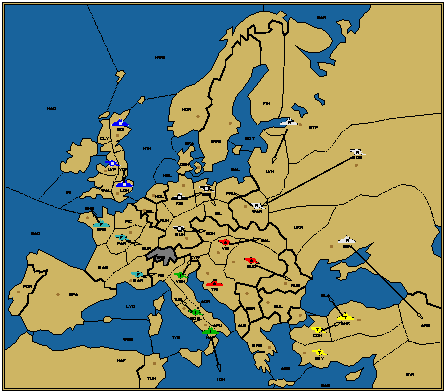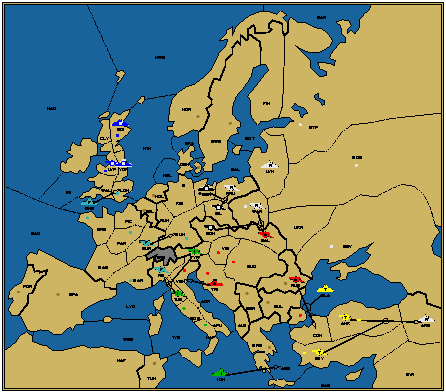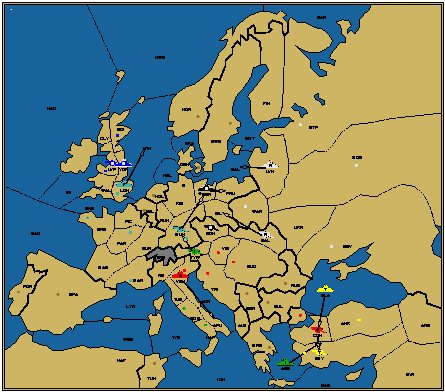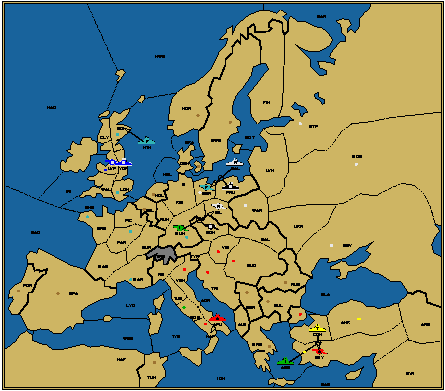
Sherlock Holmes,
Consulting Diplomat
by Graeme Ackland
Master Aenigmatist
Master Aenigmatist



|
Sherlock Holmes,Master Aenigmatist |
Holmes and I had settled in for the evening at Baker Street, with The Great Disarmament Conundrum sitting, apparently solved, on the Diplomacy table, when a card was sent to our rooms, announcing the arrival of Colonel Sebastian Moran. Holmes became immediately agitated, and as we heard the tread of the Colonel's feet on the stair, Holmes indicated that I should take a seat by the fire adjacent to the poker, while he rapidly placed a German army on the Diplomacy board.
Without exchanging greetings, Moran stated that he had come from General Roylance to check on our progress in the case. I was about to explain that the problem was solved, when Holmes indicated the board and stated that he was having insuperable difficulties and was convinced that the problem was impossible. To my surprise, Moran looked momentarily relieved at this piece of information, then his habitual scowl returned to his face and he quickly left, stating only that the leading army strategists had come to the same conclusion and, regrettably, the treaty would have to be abandoned.
I was most disappointed that Holmes should have misled me into thinking that he had solved the problem, when in fact he had merely failed, for I need hardly remind the reader that a few months later the Pan-European disarmament treaty was signed, when the architect of the triumph, the Austrian strategist Admiral von Graz revealed his plan for disarmament.
I took a trip into Whitehall to see von Graz as he revealed his plan to the Prime Minister, and was startled to observe that he was the same man I had passed on the stair at Baker Street only weeks before.
I brought back with me the von Graz plan, which I include here.
The von Graz Disarmament Plan
Obviously, each country is reduced to a fleet and an army after 1901. The two possibilities are that they are forced to retreat, and choose to disband, or they end 1901 with only two supply centers.
England and Turkey are the best defended nations, and while the Turks could have an army dislodged from Armenia or the English a fleet from North Sea, this provides further difficulties. I therefore propose that Italy, Germany, Turkey and England be reduced to two centers while Russia, France, and Austria suffer dislogements.
The single French fleet can account for the English supply centre loss, by sailing through the English Channel to a vacated London. The French Marseilles army can be destroyed by the Italians in Piedmont, the Paris army would march to Munich, and the Trieste fleet would capture Venice. The Italian fleet would spend 1901 sailing east in preparation for causing destruction in Smyrna in 1902, while Russia's northern fleet moves west in preparation for taking a German port in 1902.
The Russian fleet from Sevastopol can be destroyed in Armenia by the two Turkish armies, and the Warsaw army can fall to the Germans in Prussia. The Austrian army from Budapest makes its way to Constantinople by way of Rumania and a Black Sea convoy, and this leaves the Vienna army to be dislodged by the forces from Munich and Moscow.
In 1902, all remaining armies must be destroyed. The Italian fleet will by this time be off the Turkish coast to assist in the successive dislodgement of the Turkish and Austrian armies. The French and Austrian fleets continue to sail around the English and Italian coasts, respectively, reducing those nations each to a single supply center. In Fall of 1902, the Russian army is dislodged by the Italians and the Germans while the Russian fleet enters Berlin with German support, thus simultaneously reducing Germany to one center and destroying the French army there.
Given the reluctance of the British military to proceed with a policy which would massively diminish their own importance, it is fortunate that English forces are not required to leave the island. In fact, under the plan I have proposed, the English nation need only move one unit, and only one time. At the conclusion of the disarmament, the English unit will be left in a province adjacent to all English home centres, to handle any defensive concerns that may arise. I feel that these aspects of the plan should reassure the British Empire that little is required of it for the implementation of the treaty, and I therefore hope to obtain the support for this plan from Great Britain. I have spoken with the ambassadors of the other Great Powers, and each is pleased to announce their nations' acceptance of my plans.
Having listened to von Graz's address, I returned to Baker Street with the copy reproduced above. As it happened, Holmes was out and I had time to set up the Diplomacy board to check von Graz's solution (for though I believe I had followed his explanation, mine is not a military mind such as those of the other attendees at Whitehall). Not surprisingly, the Austrian's plan implemented the treaty perfectly, as is evidenced from the maps I include below:

|
AUSTRIA A BUD-RUM A VIE-GAL F TRI H
ENGLAND
FRANCE
GERMANY |
ITALY A ROM-TUS A VEN-TYR F NAP-ION
RUSSIA
TURKEY |
|---|
|
AUSTRIA A RUM-CON A GAL H F TRI-VEN
ENGLAND
FRANCE
GERMANY |
ITALY A TUS-PIE A TYR S TUS-PIE F ION-AEG
RUSSIA
TURKEY |
 |
|---|---|---|
|
DISBANDS AUSTRIAN A GAL FRENCH A PIE RUSSIAN A PRU RUSSIAN F ARM |
REMOVALS ENGLISH F EDI GERMAN A PRU ITALIAN A PIE TURKISH A ARM |

|
AUSTRIA A CON-SMY F VEN-APU
ENGLAND
FRANCE
GERMANY |
ITALY A TYR-MUN F AEG S CON-SMY
RUSSIA
TURKEY |
|---|---|---|
|
DISBANDS TURKISH A SMY |
||
|
AUSTRIA A SMY H F APU-NAP
ENGLAND
FRANCE
GERMANY |
ITALY A MUN-SIL A BOH S MUN-SIL
RUSSIA
TURKEY |
 |
|---|---|---|
|
DISBANDS AUSTRIAN A SMY FRENCH A KIE RUSSIAN A SIL |
REMOVALS ENGLISH A LVP GERMAN A BOH ITALIAN A SIL |
When Holmes returned, I showed him the board as it now stood, with but the seven fleets on it, and said, "How galling it must be, for you, Holmes, to have been upstaged by the very man with whom you were working in the early stages of the problem! I can understand why you chose not to attend von Graz's announcement to-day."
Holmes just smiled, then took my copy of the von Graz plan and read it over quickly. When he was finished, he turned to me. "Ah, Watson! I thought I had trained you in the art of observation a bit better than that. However, I cannot help but be happy that the charade has fooled even you."
I was quite confused by his response, and I told him so, whereupon Holmes continued, "You are aware, of course, Watson, of the rather public stand the English military establishment has made against the very notion of a disarmament treaty. In fact, this is even mentioned by my friend, von Graz, in his announcement.
"I had, in fact, solved the disarmament problem, but it simply would not do to have admitted this fact to Colonel Moran. The Colonel is but the visible henchman of the hidden hand of Moriarty, and it would not be wise to call attention to my successes to a man with his connections in both the underworld and the military. Rather, I decided to vouchsafe the disarmament plan with Admiral von Graz."
With that, Holmes chuckled and turned for his apartment, leaving me to sit in amazement once more of the subtle and complex mind of my friend.
-- Dr. John H. Watson
via Graeme Ackland
(gja@ph.ed.ac.uk)
If you wish to e-mail feedback on this article to the author, and clicking on the mail address above does not work for you, feel free to use the "Dear DP..." mail interface.

